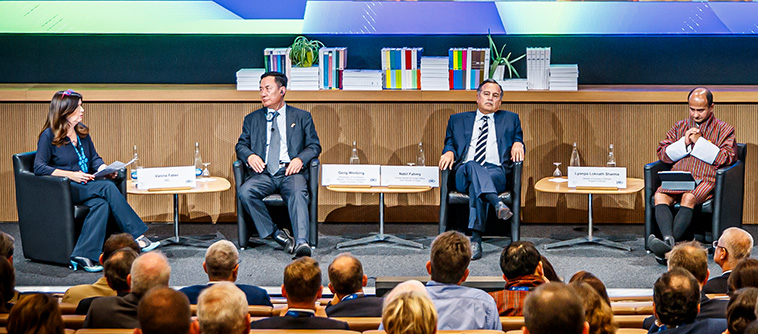The “right objective” of competitiveness in shaping public policy is to improve the lives of people, said IMD Emeritus Professor Stéphane Garelli, on day two of a conference celebrating the 30th anniversary of the IMD World Competitiveness Center that he founded.
Taking ideas from thinkers before him, Garelli had been inspired in 1989 to develop a new metric to measure prosperity – competitiveness. Because, he said, “GDP does not tell the whole story. We have to look at society at large and not only the economics.”
Garelli wanted to change perceptions about achieving success through economic growth, with standard measures often failing to capture the human impact of economic activity. It must be a win-win scenario for everyone.
During the special event at IMD’s Lausanne campus, participants learned that from Bhutan to China, many countries have taken note and are acting.
Bhutan famously introduced Gross Domestic Happiness in 1970. Lyonpo Loknath Sharma, Minister of Economic Affairs in Bhutan, confirmed that countries should use many measures to gauge their economic performance – but equally importantly – the population’s well-being.
In Egypt, where the GDP is growing, the human development index is actually regressing. For Nabil Fahmy, the country’s former Minister of Foreign Affairs, his nation is acting on that competitiveness indicator and is focused on improving the lives of youth by reforming education to increase creativity. “We’re changing the system to teach you how to think.”
How can technology improve the prosperity of its citizens?
On Friday, IMD Professor Michael Wade, Cisco Chair holder, posed this question to ministers at the forefront of digital transformation in their countries.
Estonia has built one of the world’s most innovative digital sectors while keeping people and trust at the heart of the system, explained Marten Kaevats, the Baltic state’s National Digital Advisor.
Thailand has been improving the lives of its rural citizens by extending connectivity to 80% of its unconnected villages already, with the aim of reaching 100% next year. This will pave the way for new industries and job growth in areas like smart farming, said Dr. Pichet Durongkaveroj, Former Minister of Digital Economy in the Thai government.
Who will lead the way increasing prosperity through competitiveness?
If competitiveness is to be a win-win game, then naturally it needs to be a team sport.
The private and public sectors cannot succeed in improving our lives by acting alone, said Professor Didier Cossin, who leads teaching and research on boards and governance at IMD.
Saudi Arabia, for example, is changing laws to facilitate growth, but it has also changed laws to allow more than 50% of its citizens to have better access to the economy. H.E. Dr. Eiman Al-Mutari, Assistant Minister of Commerce and Investment, said she and other women in the country “get goose bumps” of joy when they see car keys in each other’s purses.
What about the environment?
IMD President and Nestlé Professor Jean-François Manzoni asked government participants what trade-offs they have to make in policy making to drive competitiveness.
The environment, for example, has long suffered at the expense of economic activity.
“The Chinese government used to attach a lot of importance to GDP. In recent years, we have been focusing on high quality development and social development to improve people’s lives,” Geng Wenbin, the Chinese Ambassador to Switzerland, said.
For Garelli, the ultimate test of whether he had succeeded in changing how people viewed prosperity was if his competitiveness concept could survive beyond his professional research career. He handed over the reins of the World Competitiveness Center in 2014.
Now directed by Arturo Bris, the Center is growing from strength to strength, releasing this week a new innovative smart cities index.
“There will always be a need for competitiveness. We need it to work to make the people’s lives better.” – Stéphane Garelli



